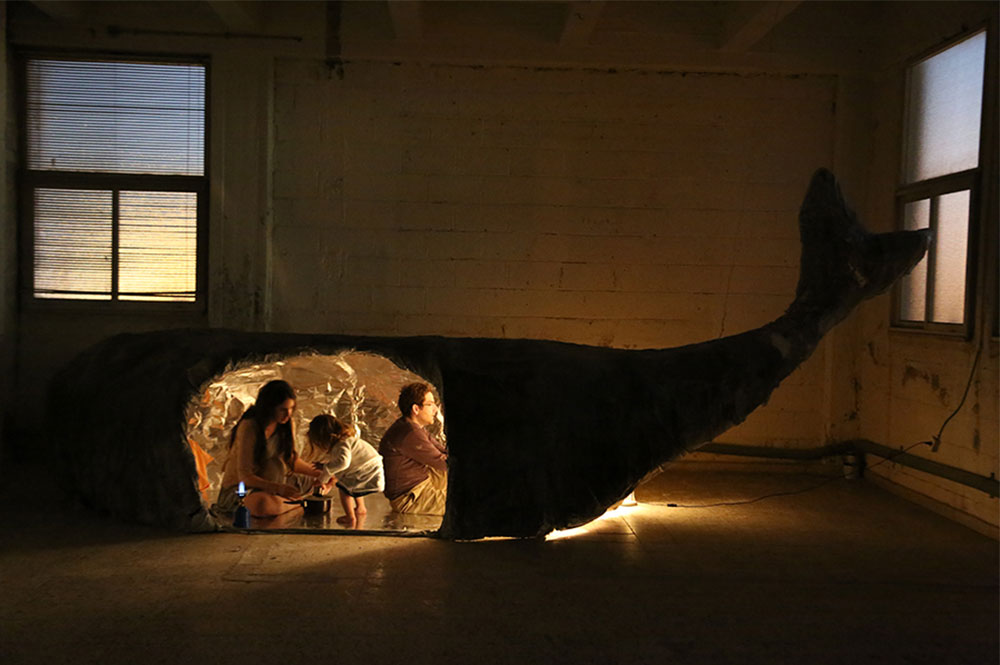Impurity, Mortality, and the Omer (Sources)
Hadassa Goldvicht: Jonah
Leviticus 12:1-6
וַיְדַבֵּ֥ר ה' אֶל־מֹשֶׁ֥ה לֵּאמֹֽר׃
דַּבֵּ֞ר אֶל־בְּנֵ֤י יִשְׂרָאֵל֙ לֵאמֹ֔ר אִשָּׁה֙ כִּ֣י תַזְרִ֔יעַ וְיָלְדָ֖ה זָכָ֑ר וְטָֽמְאָה֙ שִׁבְעַ֣ת יָמִ֔ים כִּימֵ֛י נִדַּ֥ת דְּוֺתָ֖הּ תִּטְמָֽא׃
וּשְׁלֹשִׁ֥ים יוֹם֙ וּשְׁלֹ֣שֶׁת יָמִ֔ים תֵּשֵׁ֖ב בִּדְמֵ֣י טָהֳרָ֑ה בְּכָל־קֹ֣דֶשׁ לֹֽא־תִגָּ֗ע וְאֶל־הַמִּקְדָּשׁ֙ לֹ֣א תָבֹ֔א עַד־מְלֹ֖את יְמֵ֥י טָהֳרָֽהּ׃
וּבַיּ֖וֹם הַשְּׁמִינִ֑י יִמּ֖וֹל בְּשַׂ֥ר עָרְלָתֽוֹ׃
וְאִם־נְקֵבָ֣ה תֵלֵ֔ד וְטָמְאָ֥ה שְׁבֻעַ֖יִם כְּנִדָּתָ֑הּ וְשִׁשִּׁ֥ים יוֹם֙ וְשֵׁ֣שֶׁת יָמִ֔ים תֵּשֵׁ֖ב עַל־דְּמֵ֥י טָהֳרָֽה׃
וּבִמְלֹ֣את ׀ יְמֵ֣י טָהֳרָ֗הּ לְבֵן֮ א֣וֹ לְבַת֒ תָּבִ֞יא כֶּ֤בֶשׂ בֶּן־שְׁנָתוֹ֙ לְעֹלָ֔ה וּבֶן־יוֹנָ֥ה אוֹ־תֹ֖ר לְחַטָּ֑את אֶל־פֶּ֥תַח אֹֽהֶל־מוֹעֵ֖ד אֶל־הַכֹּהֵֽן׃
She shall remain in a state of blood purification for thirty-three days: she shall not touch any consecrated thing, nor enter the sanctuary until her period of purification is completed. If she bears a female, she shall be tamei two weeks as during her menstruation, and she shall remain in a state of blood purification for sixty-six days. On the completion of her period of purification, for either son or daughter, she shall bring to the priest, at the entrance of the Tent of Meeting, a lamb in its first year for a burnt offering, and a pigeon or a turtledove for a sin offering.
Rabbi Yehudah haLevi, 'The Kuzari', II:60
. . . tzara’at and abnormal discharges are related to the spiritual impurity related to death. Death is the absolute spiritual deficiency, and a limb afflicted with tzara’at is like a corpse in this respect. Similarly, an abnormal discharge also represents death, in that the discharged material had a certain life-force, which gave it the ability to become an embryo that would eventually develop into a human being. The loss of this material, then, is in opposition to the property of life and the spirit of life.
Isaiah 6:1-5 (with thanks to Nehama Leibowitz)
בִּשְׁנַת־מוֹת֙ הַמֶּ֣לֶךְ עֻזִּיָּ֔הוּ וָאֶרְאֶ֧ה אֶת־אֲדֹנָ֛י יֹשֵׁ֥ב עַל־כִּסֵּ֖א רָ֣ם וְנִשָּׂ֑א וְשׁוּלָ֖יו מְלֵאִ֥ים אֶת־הַהֵיכָֽל׃
שְׂרָפִ֨ים עֹמְדִ֤ים ׀ מִמַּ֙עַל֙ ל֔וֹ שֵׁ֧שׁ כְּנָפַ֛יִם שֵׁ֥שׁ כְּנָפַ֖יִם לְאֶחָ֑ד בִּשְׁתַּ֣יִם ׀ יְכַסֶּ֣ה פָנָ֗יו וּבִשְׁתַּ֛יִם יְכַסֶּ֥ה רַגְלָ֖יו וּבִשְׁתַּ֥יִם יְעוֹפֵֽף׃
וְקָרָ֨א זֶ֤ה אֶל־זֶה֙ וְאָמַ֔ר קָד֧וֹשׁ ׀ קָד֛וֹשׁ קָד֖וֹשׁ יְהוָ֣ה צְבָא֑וֹת מְלֹ֥א כָל־הָאָ֖רֶץ כְּבוֹדֽוֹ׃
וַיָּנֻ֙עוּ֙ אַמּ֣וֹת הַסִּפִּ֔ים מִקּ֖וֹל הַקּוֹרֵ֑א וְהַבַּ֖יִת יִמָּלֵ֥א עָשָֽׁן׃
וָאֹמַ֞ר אֽוֹי־לִ֣י כִֽי־נִדְמֵ֗יתִי כִּ֣י אִ֤ישׁ טְמֵֽא־שְׂפָתַ֙יִם֙ אָנֹ֔כִי וּבְתוֹךְ֙ עַם־טְמֵ֣א שְׂפָתַ֔יִם אָנֹכִ֖י יוֹשֵׁ֑ב כִּ֗י אֶת־הַמֶּ֛לֶךְ יְהוָ֥ה צְבָא֖וֹת רָא֥וּ עֵינָֽי׃
I cried, “Woe is me; I am lost! For I am a man of tamei lips And I live among a people of tamei lips; Yet my own eyes have beheld The King Eternal of Hosts.”
Philo of Alexandria, De Somniis (On Dreams), 2:67
But Moses will not allow the sacred reasonings about Nadab to be bewailed; for they have not been carried off by a savage beast, but have been taken up by unextinguishable violence and imperishable light; because, having discarded all fear and hesitation, they had duly consecrated the fervent and fiery zeal, consuming the flesh, and very easily and vehemently excited towards piety, which is unconnected with creation, but is akin to God, not going up to the altar by the regular steps, for that was forbidden by law, but proceeding rapidly onwards with a favourable gale, and being conducted up even to the threshold of heaven, becoming dissolved into ethereal beams like a whole burnt-offering.
Sifrei D'varim 343:14
אש דת למו - מגיד הכתוב שדברי תורה נמשלו באש, מה אש נתנה מן השמים כך דברי תורה נתנו מן השמים, שנאמר (שמות כ׳:י״ט) אתם ראיתם כי מן השמים דברתי עמכם. מה אש חיים לעולם, אף דברי תורה חיים לעולם. מה אש קרוב לה נכוה, רחוק ממנה צונן (כך דברי תורה כל זמן שאדם עמל בהם חיים הם לו, ליפרש מהם ממיתים אותו) [ואין לאדם להתחמם ממנה, כך ד"ת נשתמש ממנה נאבד מעה"ז, פירש ממנה מת, עמל בה הרי היא לו חיים]. ומה אש משתמשין בה בעוה"ז ובעה"ב, כך דברי תורה משתמשין בהם בעוה"ז ובעה"ב. ומה אש כל המשתמש בו עושה בגופו רושם, אף (בני אדם) [תלמידי חכמים] שעמלים בו ניכרים הם [בעיני ונכרים] בין הבריות (כך תלמידי חכמים ניכרים) בהילוכם ובדיבורם ובעטיפתם בשוק.
Mishnah Yadayim 4:6:
אוֹמְרִים צְדוֹקִים, קוֹבְלִין אָנוּ עֲלֵיכֶם, פְּרוּשִׁים, שֶׁאַתֶּם אוֹמְרִים, כִּתְבֵי הַקֹּדֶשׁ מְטַמְּאִין אֶת הַיָּדַיִם, וְסִפְרֵי הוֹמֵרִיס אֵינוֹ מְטַמֵּא אֶת הַיָּדַיִם. אָמַר רַבָּן יוֹחָנָן בֶּן זַכַּאי, וְכִי אֵין לָנוּ עַל הַפְּרוּשִׁים אֶלָּא זוֹ בִלְבָד. הֲרֵי הֵם אוֹמְרִים, עַצְמוֹת חֲמוֹר טְהוֹרִים וְעַצְמוֹת יוֹחָנָן כֹּהֵן גָּדוֹל טְמֵאִים. אָמְרוּ לוֹ, לְפִי חִבָּתָן הִיא טֻמְאָתָן, שֶׁלֹּא יַעֲשֶׂה אָדָם עַצְמוֹת אָבִיו וְאִמּוֹ תַּרְוָדוֹת. אָמַר לָהֶם, אַף כִּתְבֵי הַקֹּדֶשׁ לְפִי חִבָּתָן הִיא טֻמְאָתָן, וְסִפְרֵי הוֹמֵרִיס, שֶׁאֵינָן חֲבִיבִין, אֵינָן מְטַמְּאִין אֶת הַיָּדָיִם:
The Sadducees say: “We complain against you, Pharisees, because you say that the Holy Scriptures defile the hands, but the books of Homer [meaning: non-holy books] do not defile the hands!”
Rabban Yoḥanan ben Zakkai said: “Have we nothing against the Pharisees but this? Behold they say that the bones of a donkey are pure, yet the bones of Yoḥanan the high priest are impure!”
They [the Saducees] said to him: “According to the affection for them, so is their impurity - so that nobody should make spoons out of the bones of his father or mother.”
He said to them: “So also are the Holy Scriptures according to the affection for them, so is their uncleanness. The books of Homer which are not precious do not defile the hands.”
Yuval Noah Harari, 'Sapiens: A Brief History of Humankind'
Most mammals emerge from the womb like glazed earthenware emerging from a kiln – any attempt at remoulding will only scratch or break them. Humans emerge from the womb like molten glass from a furnace. They can be spun, stretched and shaped with a surprising degree of freedom.




Comments
Post a Comment